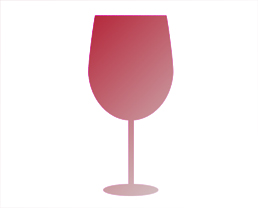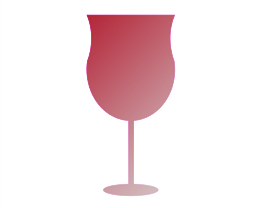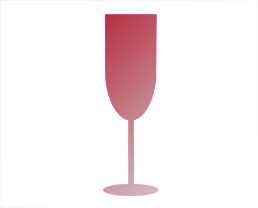Glass shape and Wine taste
Served at 6:55 AM on Monday, September 18, 2006
On an online community, somebody asked if the shape of the glass can influence the taste of wine. Well, the short answer to this is yes. The shape of a wine glass can direct the flow of wine. Also, this means that the attack (contact) will initiate a different tasting note.

A cut rim glass like the above would direct the wine to the center of the tongue, creating a harmony of fruit, tannin and acidity. It's ideal for red wines high on tannins and moderate acidity.

For red wines high on acidity, and moderate tannin, use a similar cut-rim glass but make sure it curves outwards towards the top of the glass. An example is shown above. This one directs the wine to the tip of the tongue.
Generally, Reds use bigger bowls than whites. Champagne/Sparkling wine glasses are narrow and reffered to as flutes. These are specially designed to highlight the fine bouquet, richness and complexity on the palate.

So a quick-hack understanding is that, for younger and crisper wines, a glass with an enlarged opening (outward curve towards the rim) should be used, and straight (regular) opening glasses should be used for mature and fuller-bodied wines.

A cut rim glass like the above would direct the wine to the center of the tongue, creating a harmony of fruit, tannin and acidity. It's ideal for red wines high on tannins and moderate acidity.

For red wines high on acidity, and moderate tannin, use a similar cut-rim glass but make sure it curves outwards towards the top of the glass. An example is shown above. This one directs the wine to the tip of the tongue.
Generally, Reds use bigger bowls than whites. Champagne/Sparkling wine glasses are narrow and reffered to as flutes. These are specially designed to highlight the fine bouquet, richness and complexity on the palate.

So a quick-hack understanding is that, for younger and crisper wines, a glass with an enlarged opening (outward curve towards the rim) should be used, and straight (regular) opening glasses should be used for mature and fuller-bodied wines.
Technorati tags: wine, taste, wine+glasses, types+of+wine+glasses, champagne+glasses, White+glasses, red+glasses
Labels: accessories, glass, tasting notes, wine-tasting
Comments:
intersting post, ive seen topics pop up like this in communities aswell. one thing ive heard is if they can only afford one set of glasses, which ones should they buy. What kind of advice would you give...
@Ryan: Thanks for the thumbs up! The best set in a scenario where one will afford just one, would be the first one.
It will definitely accomodate all wines, but it may not be able to push the limits of the wine and bring out its character in true sense, but it will still do enough justice.
It will definitely accomodate all wines, but it may not be able to push the limits of the wine and bring out its character in true sense, but it will still do enough justice.
this is certainly true...i have recently tasted champagne in a flute...followed by another serving in a shallow glass(can't remember what its called, but its the one in which bond usually has his martinis).
And strangely enough, champagne from the same bottle did taste different..
And strangely enough, champagne from the same bottle did taste different..
I know it's not specifically about glassware, but it is about how the wine will taste. What do you think of this:
http://www.100bestwines.com/articles/review-vinturi.htm
It's supposed to affect the taste of the wine, just as if it's been decanted, but immediately.
What do you think? Would it work?
http://www.100bestwines.com/articles/review-vinturi.htm
It's supposed to affect the taste of the wine, just as if it's been decanted, but immediately.
What do you think? Would it work?
@Ivan: Yes, it is about how the wine will taste. Glassware just helps is deciding if you want something well aerated or not. Or, how much aeration.
The link that you posted may work, yes, but you wouldn't want to try that on all wines. Reds would definitely be benefited.
Post a Comment
The link that you posted may work, yes, but you wouldn't want to try that on all wines. Reds would definitely be benefited.



